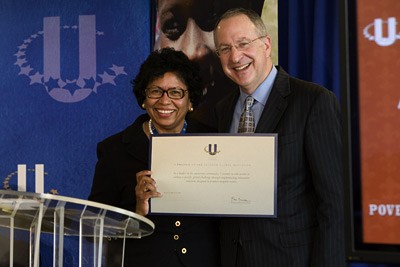Skorton presents Cornell's sustainability center as university's commitment to Clinton Global Initiative
By Daniel Aloi
NEW ORLEANS – The Cornell Center for a Sustainable Future (CCSF), created last year to address the multitude of problems that pose "grave threats to present and future human welfare" and to develop real-world solutions to sustainability problems, has been chosen as Cornell's sustainability commitment to the Clinton Global Initiative (CGI), founded by former President Bill Clinton.
Cornell's commitment was announced March 15 by Brown University President Ruth Simmons during the inaugural meeting of Clinton Global Initiative University at Tulane University. Cornell President David Skorton shared the stage with Clinton as a panelist during the event.
The announcement was met with applause by CGI U participants.
"This is very exciting, David, congratulations," Simmons said before presenting Skorton with a certificate recognizing Cornell's commitment.
The center will develop practical solutions to the world's sustainability problems "by coordinating, leveraging and amplifying Cornell's broad base of sustainability research and fostering collaborations with external partners," Simmons announced.
Cornell's commitment of $10 million to the $50 million center will be supplemented by gifts, external grants, challenge funding, contracts and other external funding sources, with $2.45 million as the first-year costs.
The center is focusing on energy, environment and economic development, which includes poverty alleviation, water and food systems, infrastructure, institutions and education.
"As an Ivy League institution and the land-grant university for New York state, Cornell has a long history and public mandate to educate, create new knowledge and disseminate and apply discoveries in ways that serve the public interest," Skorton's commitment stated. "More than 300 Cornell faculty members, in a wide range of disciplines, are already active in sustainability research."
Through the CCSF, Cornell is supporting work related to the center's missions through research; partnerships with foundations, governments, industry, nongovernmental organizations and other academic institutions worldwide; start-up and bridge funding to attract new faculty in critical areas of need and opportunity; education of students through courses, activities, research and building leadership and skills to address complex issues; and outreach by taking fact-based information to the public.
During the start-up phase, CCSF is focusing most of its resources on creating innovative research teams with seed grants from what the commitment terms an "academic venture fund."
The center will also organize workshops and symposiums to explore areas for research and development and identify Cornell communities and external partners that could be mobilized to address those needs.
Quoting from "Our Common Future," the 1987 report from the United Nations Brundtland Commission, the commitment stated: "Sustainable development meets the needs of the present without compromising the ability of future generations to meet their own needs." The statement continued: "Roughly a billion people suffer from chronic food insecurity and extreme poverty (living on $1 [a] day or less). In addition, both the developed and the developing world face increasing demands for energy while also experiencing the potentially catastrophic effects of environmental degradation and climate change."
The CCSF provides "a mechanism for multidisciplinary collaboration and communication among faculty working in the broad field of sustainability and catalyze new research teams in areas of need that are closely aligned with the Clinton Global Initiative's focus on tackling global problems with practical, innovative solutions."
The Clinton initiative, launched in 2005, focuses on solving many of the same global problems CCSF will address.
"By making a Commitment to Action through the CGI, CCSF will enhance its ability to leverage and implement its discoveries through partnerships with external collaborators. In concert with the CGI and other collaborators and funding sources, we aspire to turn our hard won knowledge into sustainable benefits for the human race," the commitment stated.
Media Contact
Get Cornell news delivered right to your inbox.
Subscribe